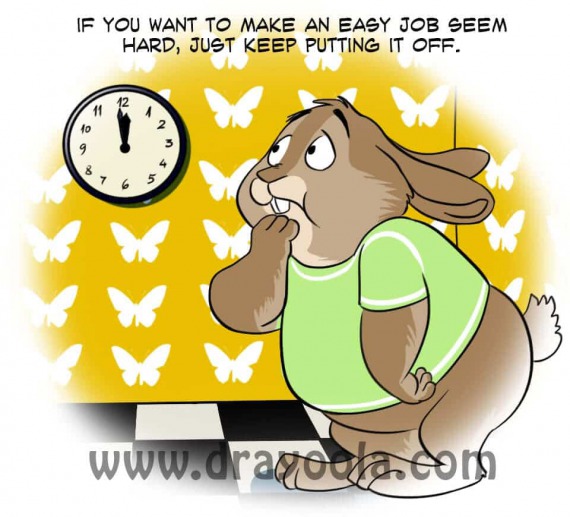Everyone procrastinates to some degree. And everything – including procrastination, is natural and healthy in moderation. But research shows that 20% of Americans are chronic procrastinators. We delay taking acton at home, work, school, with our health and in relationships. Stress, depression and weight gain are by proved by products of procrastination.
Procrastination and Stress
Constant procrastination causes increased stress – stress leads to anxiety; it makes us uptight and tense, worrying about whether we can get work done. Even if we think we work better under the pressure of an approaching deadline, it is likely that waiting until the last minute just causes more stress and bleeds over to other areas of life. Anxiety wears down the immune system and make us more likely to get sick. More and more studies are revealing how stress and anxiety are the “silent killer”.
Some proven effects of stress are:
• Headaches
• Muscle tension or pain
• Chest pain
• Fatigue
• Change in sex drive
• Stomach upset
• Sleep problems
• Anxiety
• Restlessness
• Lack of motivation or focus
• Irritability or anger
• Sadness or depression
• Over or under eating
• Drug or alcohol abuse
• Social withdrawal
• Increased likelihood for acute and chronic illness
A good way to avoid any of the above conditions is to reduce stress, and a surefire way to reduce stress is to stop procrastinating!
Procrastination and Weight Gain
Stress is not the only risk factor with procrastination. Procrastination can also increase the chances of delaying essentials such as sleeping, exercising or eating well. These factors are critical in fighting off chronic disease and other negative health outcomes. Research shows that individuals who already have health conditions (such as obesity, high blood pressure, depression and/or most eating disorders) and also chronically procrastinate are much less likely to seek medical help (although the desire to be well is very present).
Dieters or wannabe dieters may procrastinate starting a weight-loss regimen because of past failures, and memories of deprivation and hunger. We wait for a perfect weight-loss scenario to begin a “diet” or new exercise routine. We set unrealistic goals. Generally, the scenarios never happen and the goals are never accomplished – in fact the normal outcome is weight gain rather than weight loss.
Easy to grab unhealthy snacks and comfort eating are also an effective way of delaying doing what one does not want to do. The procrastinator tells himself, “I will eat a light dinner and then maybe make myself a cup of tea and a couple of cookies for dessert. Oh, I think I will pop some popcorn while watching the end of my favorite TV show and fish out the ice cream from the freezer to take away the salty taste of the popcorn and then…” Eventually time passes and suddenly there is no time to pay the bills, or phone the parent, or clean up the garage. On top of that, an he has eaten 1000 additional calories.
Procrastination is a huge stumbling block to effective dieting. How many very low-calorie ice cream bars or bowls of air-popped popcorn can the dieter justifiably eat while procrastinating without eventually undoing the diet? And how long can the dieter avoid, as the example is managing to do, engaging in some exercise and non-eating activities, without this influencing the rate of her weight loss?
Not only can procrastination have a negative impact on your health and safety; it can also harm social relationships. By putting things off, we place a burden on the people around us. If we habitually turn in projects late or dawdle until the last minute, the people who depend on us such as your friends, family, co-workers, and fellow students can become resentful. All of this adds up to make us feel bad about ourselves. Shame and guilt, anxiety and depression, and hopelessness then follows.
For many, ending procrastination is not as easy as simply deciding to get your work done. Often, people procrastinate because the temptation to do what makes us happy right now overrides the knowledge that getting work done will make us happier in the long term. We won’t feel differently about the task at hand tomorrow. In fact, we will probably feel worse about it. So it is recommended that we focus on how our future self will feel if you don’t get the work done now. Take a breath, try to calm down, and just get started on that task (whatever it may be). Try to think about how tobegin the task. Don’t think about how difficult it may be, or how long it will take. (Many procrastinate weight loss for this very reason!) Set small goals on the way to completing the larger task. And if we start the task or goal, we are much more likely to finish and not put it off.
So just get started.
If we keep waiting to be in the mood to go to the gym, or to begin your work, or to eat better, or to lose weight, we will never get them done.
“It is only when we truly know and understand that we have a limited time on earth – and that we have no way of knowing when our time is up – that we will begin to live each day to the fullest, as if it was the only one we had.” – Elizabeth Kubler-Ross
Looking for immediate weight loss options? Start here


